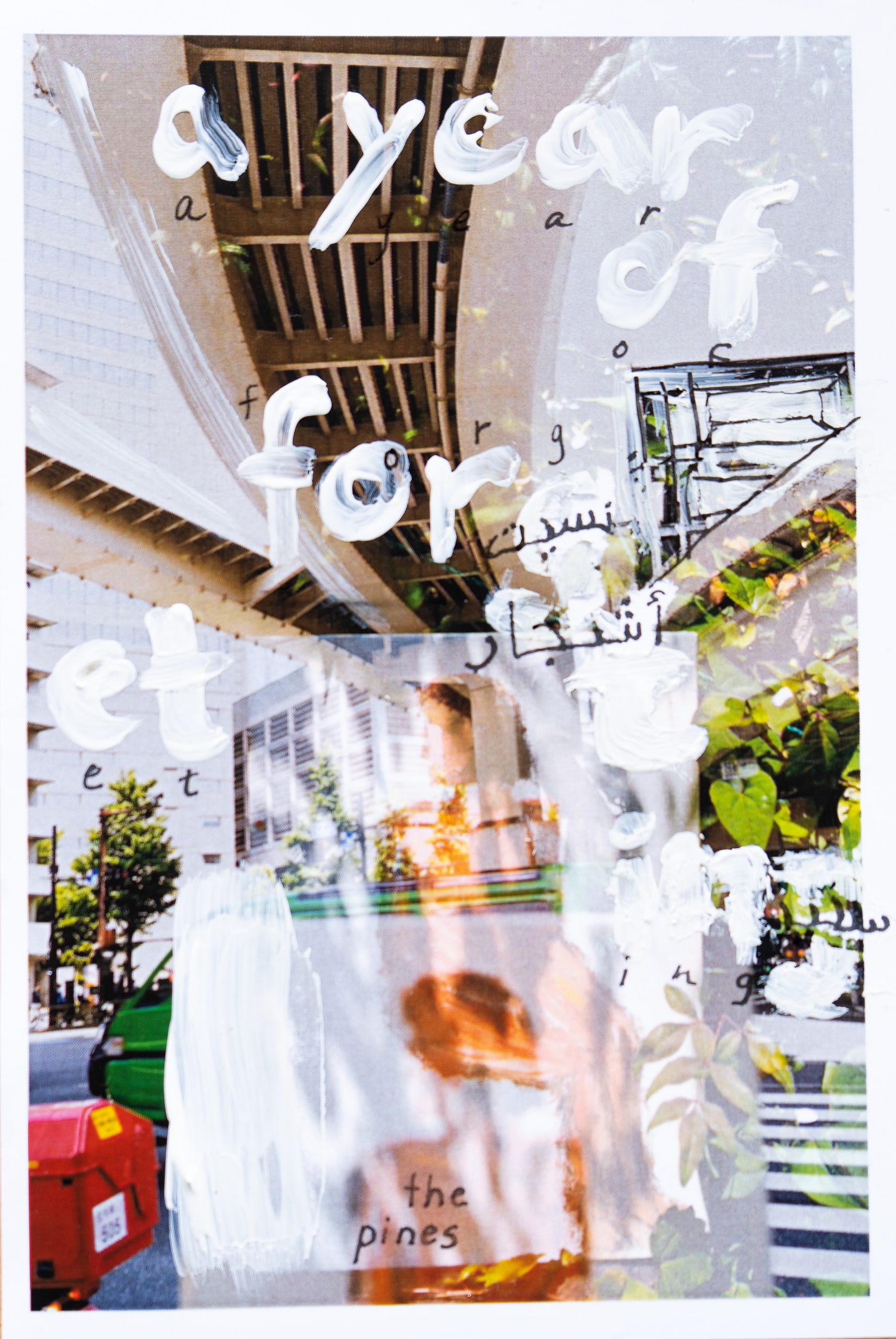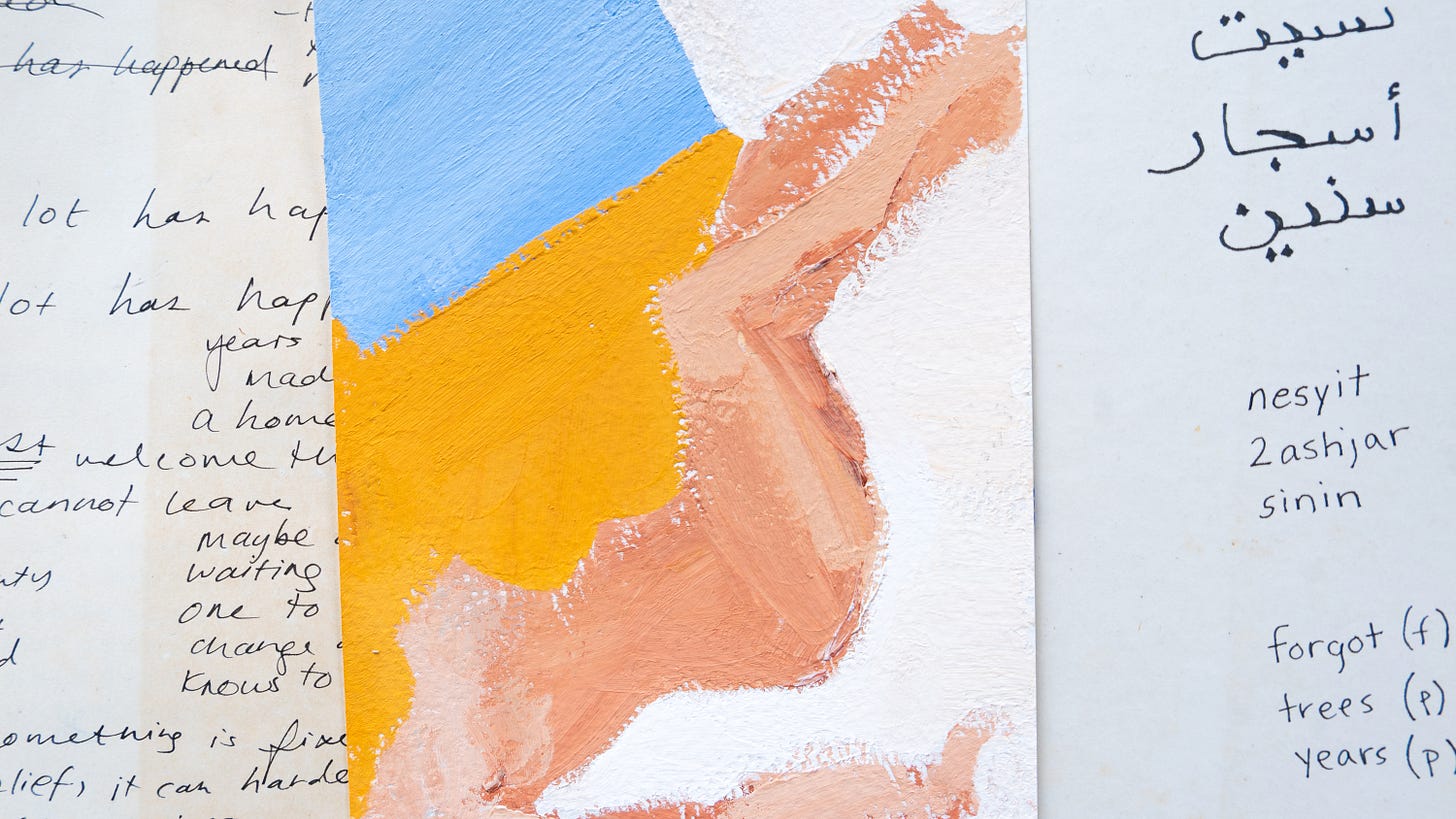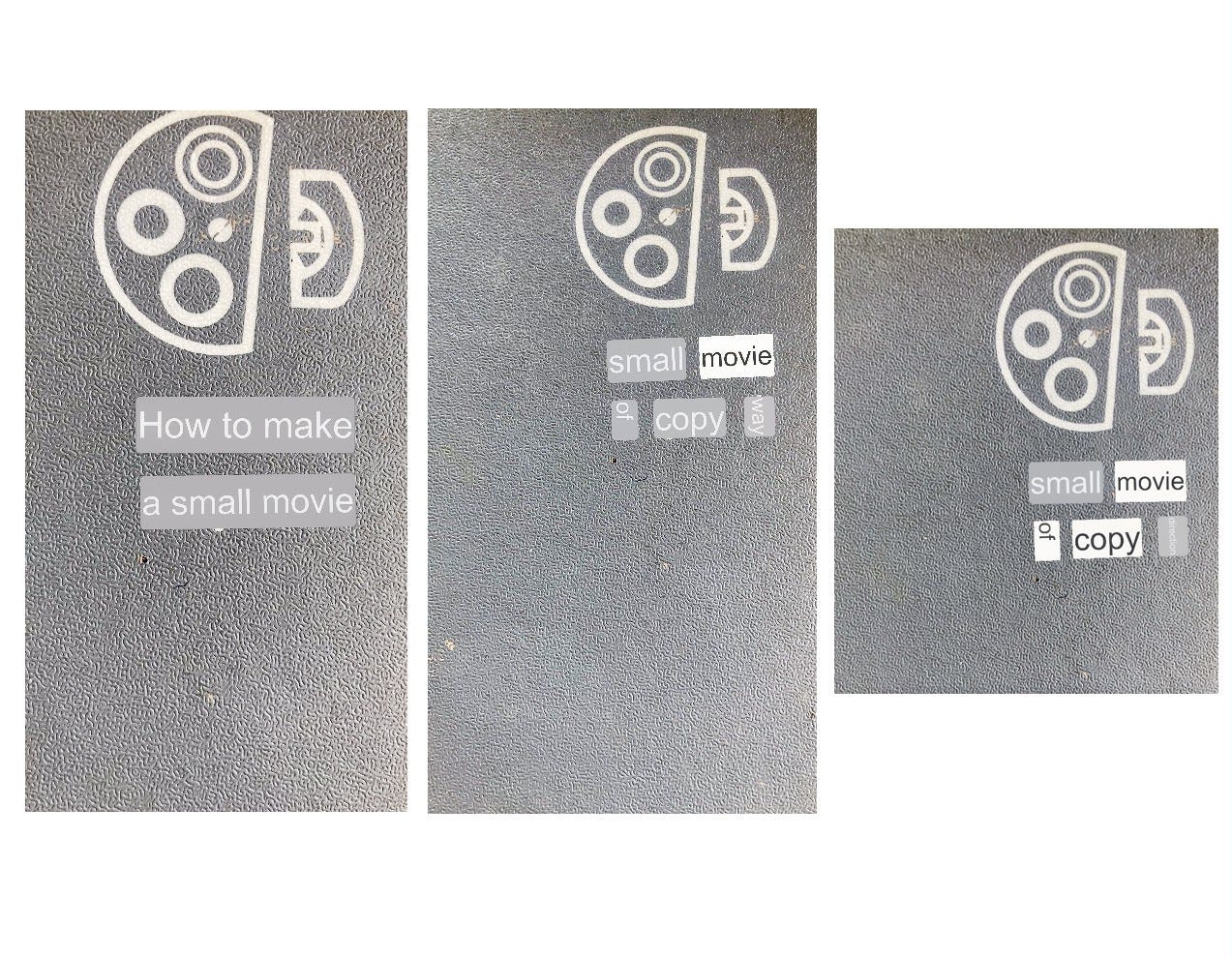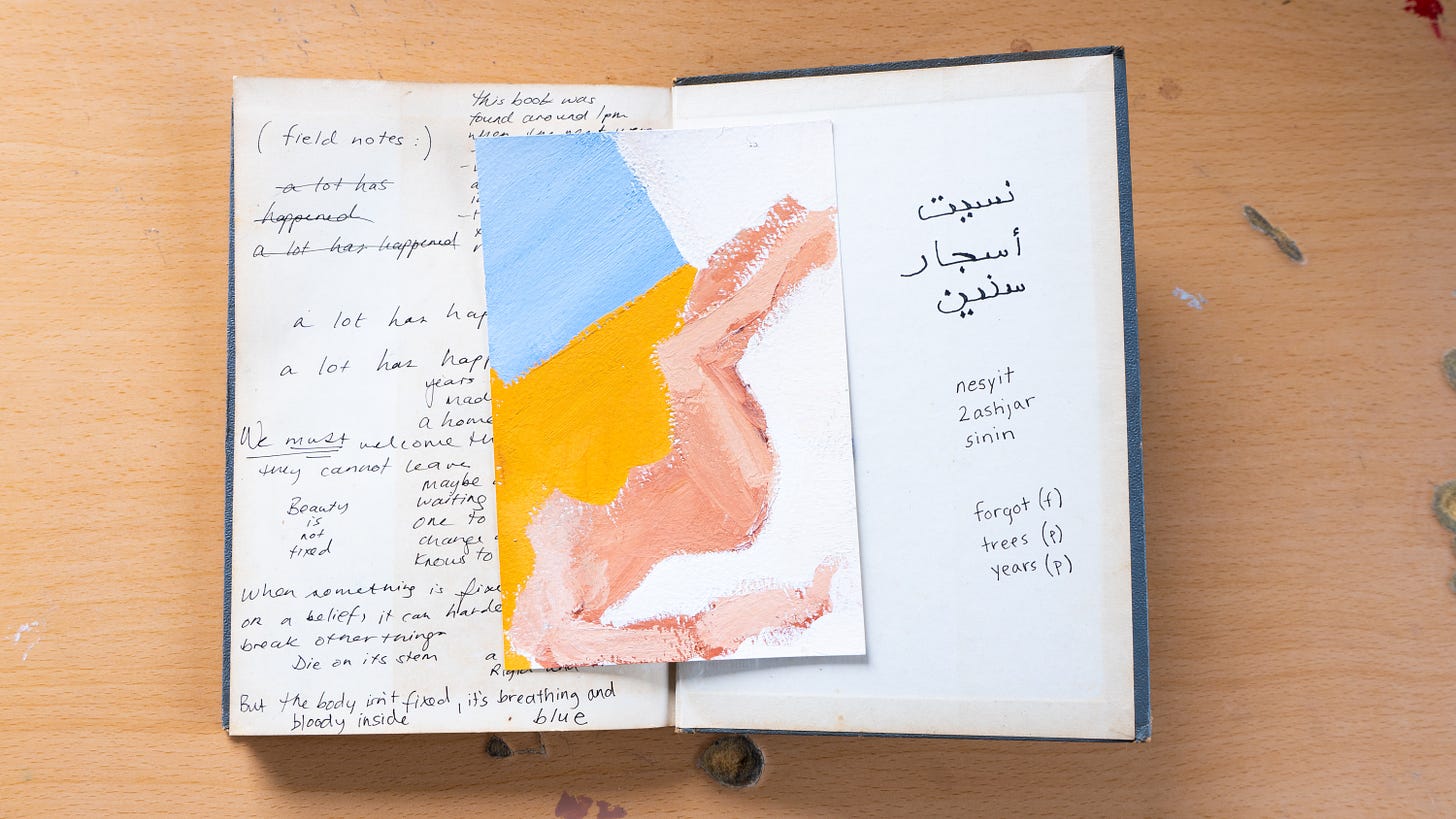A year of forgetting the pines
Artifacts, language lost, remembering, origins, and the unanswerable
A year of forgetting the pines
a solo exhibition by Jes Kalled at Gallery Paradiso
| June 20th - June 25th 13:00 - 20:00 |
Friday June 23rd, at 7pm: a live painting performance with artist & musician, Ippei
似顔絵は英語で何っていうですか? Miho1 asks in Japanese, tilting her head slightly. Ippei2 looks down at his phone. So do I. Three heads bow in silence, not in prayer, but in search of an English replacement for the word, nigaoe. Ippei looks up. He points to his face, his body, then paints the air with his hands, elaborating more in Japanese words that I do know. When I understand what he means, I blurt out: Portrait!
Nigaoe. Portrait. I repeat, relieved that we’ve found a definition to one of many words that I still don’t know.
A man arrives at the cafe on his bicycle. He parks just behind Ippei, and smiles. From where I’m sitting, it appears the man is smiling at somebody he knows inside the cafe, through the glass window. From where Ippei sits, there is another story.
Ippei says: I think that man just smiled at his own reflection.
Miho replies: Surely not. There must be someone he knows inside.
The two of them wonder for a few moments about which is true. Was he seeing himself, or was there really someone else to smile to? They return to our conversation, landing once again on “portraits.” They ask me: What will the title be? The title of everything? What will you call it?
I tell them I don’t know.
But maybe,
I want to call it: A year of forgetting the pines
What do they think? I ask. どう思う?
A year of forgetting the pines
I was living somewhere, as if placed in a scene that somebody else wrote. I believed in this scene. As if it was written for me too. The sofa on the floor, the lamp, the bath, the soft murmurs;
touches when making coffee, (the brushing of elbows)
There was the sound of the wind at the window, a whistling, then a rattling, who became companions of mine while waiting for him to return,
or to wake from hours of sleep .
These elements were all real in their own right, but they unfolded in an environment that was, in a certain sense, fabricated. There was always, hanging over every object in the room, over every sentence when we spoke, something that was not real, though I did not know it then. There were things left here, or there that I wanted to understand, but didn’t and wasn’t allowed to know. I often asked, and find myself still asking of other things: what does this mean? And, is this real?
field notes; ( as written inside the back cover of artifact 1 ) a lot has happened, a lot has happened years of layers have made themselves a home, we must welcome them because they cannot leave Maybe a layer is waiting for the next one to arrive and change all that it knows to be true Beauty is not fixed When something is fixed, an idea or a belief, it can harden, cut and break other things Die on its stem: a half-life, rigid and un-lived But the body isn’t fixed, it’s breathing and bloody inside Blue
In Of the overgrowth in places not meant for planting I wrote about love’s relationship to uncertainty and doubt. In this world, there is a strong suggestion that Love is the antidote to Pain, Loss, Loneliness. And maybe it is. But what this suggestion doesn’t readily acknowledge is that Love takes many shapes; a concept with countless definitions, understandings, and caveats. With love, comes the company of a human being; guests with other understandings that can be miscommunicated, hidden, uninvited, or ambiguous.
Almost from the beginning, I knew F3 would leave—that our cultures would keep us apart always—so, our relationship was a brave renunciation of Guarantee. I felt that the length of time (the little we would have) was a fair trade for being connected to a person the way I felt connected to him. I saw the benefit in friction; an opportunity for change to take root. I was, perhaps, forgetting that I wouldn’t be able to philosophize my feelings; that being hurt, getting hurt, is just going to hurt. And that I wouldn’t be able to predict how much it would.
Everything that held memory in his apartment would disappear and I knew this much. The sofa, the lamp, the bath, the soft glances. Having lost people before, I sought to surrender myself to these notions, to accept these things in their state of leaving. I thought my discomfort with the relationship came from the nature of it: the tension of having to let it go. Though I questioned the shapes of my surroundings when they began to alter into shades of red, I did not blame what was present or external from me for the discoloration. Not F, who assured me, always, that all was well. I spoke a lot. And I thought too much. He said.
What I didn’t account for, was someone with an entirely different intention and method for how to love, live. A person behind the other. Someone with a different definition of what was okay, and what was not, with much grey found in the gaps—still left unnamed. Words are tools, the ingredients of language that shrink or expand at the needs of those using them to communicate, express, or listen. Lies, it would seem, are where the tool is rendered useless, where the soul of language, it’s truth, dies. As a writer, I use words to understand my situations. Not only with others, but with myself. In that situation I was powerless. The value and impact of my words was meaningless to someone who didn’t apply meaning to their own.
It would seem obvious to any onlooker that a Temporary relationship, a Temporary time, and a Temporary place is a way to take advantage of someone or something. And it can be. But I have never seen Temporary that way, and neither may he—though Taking is exactly what he did.
What I did learn, was that feeling unloved and used is one of the most painful experiences one can feel, and in the absence of knowing the whole truth, one has no other choice but to learn how to read and honor theirs.
Only now, after enough room away from the subject, can I see that honoring the love between us was, in part, to ignore the slow, inner dying of one person in favor of the other. I was swallowed. In something I didn’t really—wasn’t allowed to understand.
Exhibition excerpt from Tokyo Weekender
Multidisciplinary artist, Jes Kalled, presents parts of memory and perception in their shifting forms and textures across the mediums of photography, oil paint, text, video, and audio. A year of forgetting the pines gives shape to language, and loss of language, touching on the layers of intimacy in a relationship with secrets and distance. Symbols and patterns repeat almost ancestrally.
The viewer is offered images of Body as home of change, interlacing our histories to our present happenings;
Body when placed in external Location: representations of the artist's neighborhood in Tokyo, containing elements of the city, and the nature it allows to grow within it.
A year of forgetting asks, "And what of the pine trees from home? Are they still there, at my grandmother's house?"
Just after I published the announcement of “A year of forgetting the pines,” my dad posted a video of himself on a bicycle (wearing a helmet and sunglasses), as he passed by a forest of pine trees, a pond at its center.
Artifact 1:
There are artifacts left behind from this time spent with someone. One day in June, almost one year ago, I couldn’t sleep. F had gotten into a fight. Like most things that don’t make sense, the public escalation brought forth one police officer, then ten. By the end of the early morning, there were about thirty officers in blue shirts, two bored detectives in black, bullet-proof vests beneath their suits, who arrived by car, and a growing, restless crowd of twenty or so spectators with their phones out, watching. One of them asked who I was because she didn’t know I existed in F’s life. I remember the sharpness in her eyes, the exact way she looked at me in disbelief. My body went numb, but there wasn’t a moment to pause, to consider anything but F, and safety. Z4, M, and I kept asking everyone to leave. Finally, they did. Only then, in the persuaded silence, was F able to calm down, relocate himself; remember where, when, and who he was. Later, he said he felt like he was drowning.
When we got back to the apartment, F and his friends spoke about what happened to one another in Arabic. I asked them to translate but little was said that I could understand. I protested. They soon fell asleep. I couldn’t. I still had on the sparkly dress I was wearing from the night before. I peeled it off my skin, which was red and raw from the friction, and changed into some of F’s clothes: a grey quarter-sleeve shirt, a peach denim jacket, a pair of mismatching white socks, his sneakers and his jeans with a belt. Nobody woke up, so I wrote a note, left the building and went for a walk. I tried, with desperation, to find something green. It wasn’t long before I came upon the Rikugien Gardens5, a place I had always wanted to go, but hadn’t yet. I didn’t know Rikugien was so close to the apartment where they were staying then.
When I went inside, I felt as if I was betraying a different timeline of mine. A person distant and foreign. Was there a version of me somewhere that walked inside the gardens wearing her own clothes? Was there supposed to be? I couldn’t see very well because I had to take my lenses out, and my right eye was slightly swollen from being elbowed in the crowd a few hours before. I remember lying down somewhere quiet, surrounded by trees. On my back, I felt all the wrong creeping in; the disfigurement, as if just by breathing I was overwriting a scene of calm with something strained, wounded, and unclean. I worried I brought the chaos in. The noise. A black butterfly landed on a flower. Kuroageha. クロアゲハ。I tried to locate every opposite; the originals, the empty threads of how things were supposed to be, and match them with how things were. But I couldn’t, there was no shape once cut that could go back into the fabric from where it came.
In the neighborhood, I walked. I went to a flower shop. The owner wanted to know where I was from, and why I was there. She seemed to notice my odd appearance; perhaps my disquiet was visible, the clothes or the skin that didn’t fit. I couldn’t tell her the whole story, but I told her about my grandmother’s house; the quiet of the lake, the pine needles that turned red after they fell; the boys in an apartment nearby, sleeping. I was here with them, I said. She gave me a small bouquet of flowers as a gift, and told me to come back again someday. I sat outside at a Vietnamese restaurant that had just opened, and ordered something spicy. I spoke with the owner’s daughter in English. She gave me a red bottle labeled, Chin-su, that would add more spice to my sandwich, and told me she was apprehensive about running the place while pregnant. Japanese language was difficult and strange, she said, but she wanted to learn. I went to a taiyaki6 stand down the street, where you could choose chocolate filling instead of anko.7 I remember savoring the thick sweetness in my mouth. Something familiar, from before, like trapped light. I found a store run by an elderly woman in her eighties. She couldn’t stand, and smiled when I entered. The store was small, an extended closet to the sidewalk. Inside, there were shelves of stuffed animals, ceramics, blankets, boardgames, books, and second-hand clothing. This is where I found artifact 1: a camera book I bought for 100 yen because it smelled like my grandfather’s house. My grandfather’s house. An endless study. Rooms of dusty books and cameras, voices in Arabic from a radio in the other room, music that seemed to come from a secret that was no longer here; residing only in unknown and unrecognizable shapes; forms I knew, but didn’t, wasn’t allowed to,
claim, in their entirety.
not in whole ness, only ever in frag ment .
The book I found is written in Japanese, and sits on my desk now. The other day, I picked it up for the first time in months. When I opened it, it landed on a page in the very back with English translations. The list is alphabetical, it reads:
[ F ]
F. Number エフ ナンバー
Frame フレーム
Frame line フレーム ライン
Fade in フェード イン
Fade out フェイド アウトField of view フィールド オブ ビュー Film gate フィルム ゲート Filter フィルター Fixing フィクシング Flash back フラッシュ バック Fog フォグ Focus フォーカス
Another, but very different, Page of F.
I don’t think about that morning anymore. For a while when I did, I was reminded of how I went searching for a way to replace it, and found a book with the tools to do so.
field notes; ( as written in artifact 1 ) a lot has happened, a lot has happened years of layers have made themselves a home, we must welcome them because they cannot leave Maybe a layer is waiting for the next one to arrive and change all that it knows to be true Beauty is not fixed When something is fixed, an idea or a belief, it can harden, cut and break other things Die on its stem: a half-life, rigid and un-lived But the body isn’t fixed, it’s breathing and bloody inside Blue نسيت (feminine) nesyit forgot أشجار (plural) 2ashjar trees سنين (plural) sinin years
Art Director, and owner of Gallery Paradiso in Yoyogi Uehara
Artist and Musician in Tokyo
F, introduced here in Birds and bread and honey
Z is F’s friend, seen also in Under Construction
Rikugien 六義園 りくぎえん “Garden of the Six Principles (senses) of Poetry”
taiyaki 鯛焼 たいやき a fish-shaped pancake, usually filled with “anko”
anko あんこ: red bean paste






I am continually astounded by the depth of your writing and by your admirable ability to be vulnerable. Thank you for sharing
I super love how you wove your story into layers and then writing at the end, saying maybe another layer is waiting to arrive, which may change how you view, think, etc. This visualizes all things in life full of motion and changing as we are always. Such an artist, thanks for the movement, thank you for sharing.